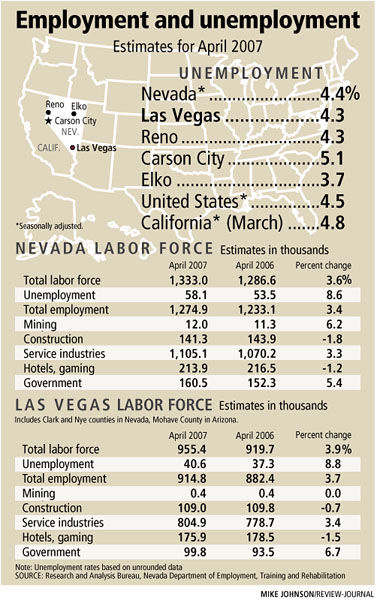Housing slump socks workers
A moribund housing market is enlivening unemployment offices across Nevada.
The state's jobless rate crept up from 4.3 percent in March to 4.4 percent in April, the Department of Employment, Training and Rehabilitation reported Friday.
Job growth in Nevada dipped to 2.7 percent in April, down from 4.8 percent in April 2006. The last time the state's job formation was that low was in May 2003.
Department officials attributed much of the uptick in unemployment and the slowdown in job growth to a lagging home-building sector.
Jim Shabi, an economist with the agency, said the state's building sector lost 2,600 jobs, or 1.8 percent of its 141,300-person work force, year over year in April.
And though the construction industry employs 11 percent of Nevada's work force, the sector accounted for 25 percent of unemployment claims filed through the department.
"We're not building as much housing, and the commercial (construction) sector has not completely made up for that," Shabi said.
Builders closed on 1,771 new homes in Las Vegas in March, down 50.9 percent from the 3,606 units they sold in March 2006, according to real estate research firm SalesTraq.
"It's hard to keep up with (4.8 percent job growth)," said Terry Johnson, director of the Department of Employment, Training and Rehabilitation. "When you have numbers that high, unfortunately, there's only one place to go. It becomes challenging for our economy to keep up with that level of growth."
The Silver State's unemployment rate remains below the nation's 4.5 percent joblessness level.
Nevada's job creation remains above the nation's labor growth, which was 1.4 percent in April, Johnson said. Plus, figures from the federal Bureau of Labor Statistics show Nevada ranks No. 6 in the nation for job formation, Johnson added.
The department said several other trends, such as high gasoline prices, could be hurting Nevada's economy. The cost of a gallon of regular unleaded fuel averaged a record $3.25 statewide on Friday, data from travel club AAA show. Gasoline was running $3.18 a gallon in Las Vegas, tying the all-time high of a year ago.
The department also noted in a statement Monday that November ballot initiatives raising the minimum wage and banning smoking in some businesses might be affecting Nevada's labor market.
Question 6 boosted the state's minimum wage from the federal $5.15 an hour to $6.15 an hour. Question 5 prohibited lighting up in convenience stores, grocery stores and bars that serve food, among other types of establishments. Taverns across the state shuttered their kitchens to comply with the referendum.
Unemployment claims in the food preparation and service segments spiked 51 percent in the first quarter of 2007 when compared with the first quarter of 2006, the department said. Job growth in full-service restaurants fell from an average annual gain of 8.9 percent between 2003 and 2006 to 6.7 percent in the first quarter of 2007.
Jobs in the first quarter declined 2.9 percent in the "other gaming" category, which includes the slot-route operators who collect money from gambling machines in stores and bars. That compares with 1.3 percent job growth in the category between 2003 and 2006.
The department didn't include April numbers in the report.
Nevada's three metropolitan areas experienced small adjustments in unemployment.
The share of unemployed workers in Las Vegas was 4.3 percent in April, up from 4.2 percent in March. The ranks of the jobless fell in Reno-Sparks, from 4.4 percent in March to 4.3 percent in April. In Carson City, 5.1 percent of the labor force was out of work in April, down from 5.2 percent in March.
Johnson said unemployment in Nevada could show "minor spikes" in coming months as teens, school teachers and education administrators search for summer jobs.
Joblessness might begin to drop by the fall, Johnson said, as commercial and resort construction ramps up and the housing market stabilizes.
"I think the Nevada economy is still moving forward," Johnson said. "The state remains a competitive place in which to do business and find employment."
Though Nevada's job market is healthier than the nation's employment climate, continued efforts to improve the state's labor force are essential, said Gov. Jim Gibbons.
"While Nevada's economy continues its healthy growth, it is important that we keep it strong for the people who already live here as well as for the people who are coming here," Gibbons said in a statement. "My administration is committed to keeping our work force competitive. That is why I urge the Nevada Legislature to fund work-force development at the level I have recommended."






















